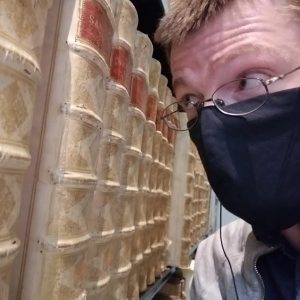
During spring break week in mid March, as many of the Catholic University community were away from campus, the Archives staff met to discuss our contingency plans for the spreading pandemic. Our researchers from across the United States and the world were beginning to cancel or delay scheduled appointments, and we began to determine how best to shift our services and resources online. With little time to prepare, we readied the stacks for a possible long-term closure.
Friday, March 13, 2020 would end up being the last normal day of work at the Archives. (Yes, Friday the 13th was when our “luck” ran out.)
When we think of essential workers during the current crisis, we rightly think of medical professionals, delivery drivers, grocery and pharmacy employees, custodians, etc. But even among those professions mostly teleworking, there are those who exercise an essential function. In addition to the facilities staff (a huge shout out to them!), many administrators and librarians at Catholic University have continued coming to campus to assist in the transition to online instruction, to guarantee that students and faculty (as well as most staff) could remain safely at home.
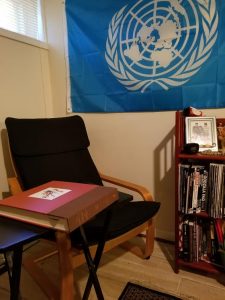
As for the Archives staff, we need to monitor our collections to guarantee that the humidity and temperature levels are maintained at proper levels, that leaks are not occurring, or that bugs are not infesting the stacks! Plus, as many online collections as we have, most of our materials are still only available onsite. Each of our staff received a letter marking us as essential employees, able to come in to protect the collections during the strictest period of the DC shutdown.
Does that mean we took unnecessary risks to visit the stacks? No. Most of us continued to telework, with two of our staff (who live close by or can drive in) stopping in one to two days a week to check the collections. (A special thank you to Archivist, John Shepherd, and Special Collections Technician, Brandi Marulli, for keeping the onsite stacks maintained during the first few months of the pandemic. Not to mention Curator, Maria Mazzenga, and Graduate Library Pre-professional, Amanda Bernard, for expanding our digital presence during the shutdown.) As for me? I began to return to the onsite collections in June.
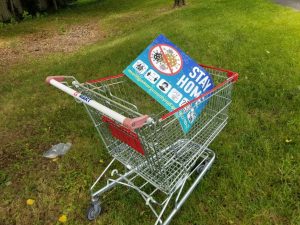
Overall, I have been fortunate thus far. I’ve been able to mostly telework, have kept my livelihood, and been healthy. As a current graduate student, despite my displeasure at endless Zoom sessions, my remote classes have kept me busy. (Knitting during Zoom classes tends to help me stay focused on the lecture/discussion!)
With that said, I do live alone. Many days are long, with my small basement apartment becoming the center for my entire life. For over four months, often the only outdoor activity I may get is an occasional walk or an early morning trip to the grocery store.
My family is back in central Nebraska, and they reside mere blocks from a meatpacking plant forced to remain open, despite becoming a hot spot for the virus. My family had no options for teleworking and the local authorities seemed unwilling to take the pandemic seriously. For months, almost every morning, before logging into my laptop to work remotely, I would talk to my relatives on the phone to see how everyone was doing and check in myself. (So far, so good!)
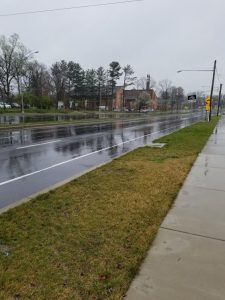
All this has made me reflect on my short- and long-term plans. Every year, I visit my family several times. But not in 2020. Maybe not in 2021. Wherever I have been in life, I have always found my way back to Nebraska every Christmas and New Years, to see my family and childhood friends. This may be the first time in my life I must skip that journey, for fear of risking my family’s safety by traveling.
I worry about finances, as so many schools and businesses face tough economic choices. I consider my meager savings now as not only a cushion for myself but possibly for my distant family and friends.
While taking graduate coursework during a pandemic is a challenge unto itself, I am relieved to have the distraction. But also taking these courses has helped provide a sense that my life is not stagnating in quarantine, that I am advancing in some capacity while sitting at home most of the week.
I have friends and family who are public school teachers, rewriting their wills as they are potentially put back into classrooms too early, grocery store workers and truck drivers on the “front lines” for months on end with no breaks, and childcare workers furloughed. I know people who (incorrectly) claim the virus is a hoax, and others who will never leave their homes out of fear of getting sick. I know people afraid, people struggling, and people offering hope.
I live mere blocks from a food pantry. One to two days a week since late March, a long line has stretched down the street from it. It is heart-breaking to see, but it is also encouraging that the pantry keeps helping. Volunteers still go in, despite any personal risks to health. Food is still being handed out to each person in that line. Donations keep coming in.
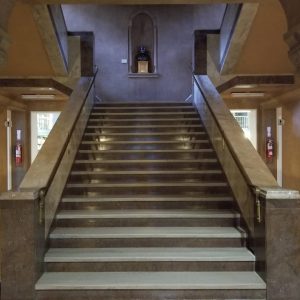
Collecting stories can be exhausting – reliving my own experiences of the pandemic or empathizing with those submitting their own accounts – but it is crucial work to preserve our tales for the future, to vocalize our experiences, and to help us understand that we are part of a broader web of human experiences during challenging times.
There are millions of stories during this pandemic. Many negative, some positive, and most still being written.
Keeping a journal myself, I want to end with one short reflection I wrote a few weeks ago, after I came to campus and had entered the still-closed library:
As I entered Mullen Library at 6:30 in the morning to check on the collections, I found myself alone in the building. Staring over my face covering and fogged-up glasses, I found a sight I usually love – a quiet, uncrowded library.
But not like this.
Not for these reasons.
Not due to a pandemic keeping patrons away and staff at home. Not from an economic crisis forcing us to make hard choices about what services we can provide. Not due to BIPOC students feeling targeted on campus, thus feeling unwelcome in their own library.
So many of us as individuals, groups, and localities have sacrificed to slow this pandemic, have helped those hurting economically, and have protested and started the long-term processes of confronting our own internalized and institutionalized racism.
Staring around me at dawn, this quiet library served as a reminder of both these challenges facing us and the collective actions we are taking to address them.
It is shuttered to help us control the spread of a virus. It is quiet due to staff mostly teleworking, with the Library working to maintain their employment and health in uncertain times. It is a time in which libraries are further reflecting on and working to address institutionalized racism in the profession, while providing (usually digital) sources to help others learn about these issues.
What will define this empty library – the challenges of the present moment or the work that hopefully helps and changes our culture? I’m a historian, not a seer, but I’ll do my best with my small platform in this currently quiet library to help.
In a few short weeks, there may be more people going up and down these stairs. While I’d like to see that, I do have concerns. So I’ll keep my mask and hope handy.
Just one account among many during these times of pandemic, social change, and economic upheaval.
To learn more about submitting your own story, please see this form. Questions or concerns can be addressed to: lib-archives+covid19@cua.edu

Wonderful text, Shane!
Best wishes, Arpad v. Klimo (I think I was the first customer to come back to the library!)